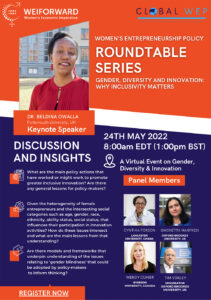
- This event has passed.
GENDER, DIVERSITY AND INNOVATION: Why inclusivity matters.

The WEI Global Institute (WGI) collaborates with partners, such as the Global Women’s Entrepreneurship Policy Research Network (Global WEP), to engage academics, policy makers, private sector, and key stakeholders. The virtual roundtables aim to identify and address issues & solutions, share lessons, and advocate for changes necessary to advance gender economic equity.
Our inaugural 2022 series is co-sponsored by the WGI and the Global WEP.
Join us on May 24 for the first in a series of three roundtables on GENDER, DIVERSITY & INNOVATION: Why inclusivity Matters. To join us, register here: https://bit.ly/WEI-Roundtables

Tuesday, 24 May 2022 8:00am EDT (1:00 pm BST/2:00pm CET)
GENDER, DIVERSITY AND INNOVATION: WHY INCLUSIVITY MATTERS
Women are under-represented in processes of innovation worldwide. Part of the explanation for this is “gender blindness” which conceals the gendered nature of innovation processes (Pecis, 2016). By focusing on innovation products, processes and systems, the role of the innovator has been overlooked (Alsos et al., 2013). Therefore, while the positive impact of gender diversity on creativity and innovation is well-evidenced (Bouncken, 2004; Dai et al., 2019; Díaz-García et al., 2013), the role of diversity in innovation processes within the lens of entrepreneurship, i.e. how individuals mobilise resources and processes in creating value through innovation, remains under-explored.
Central to a better understanding of the gendered nature of innovation processes – and hence better innovation policy – is an understanding of the intersectionality of socio-demographic categories such as age, race, ethnicity, class, ability status etc., which have been consistently shown to create additional barriers for under-represented groups (Carter et al., 2015; Marlow and Martinez Dy, 2018; Vorley et al., 2020).
This round table session aims to highlight what is known about women innovators in different geographical contexts, identify what gaps are still to be filled and, as a consequence, illuminate the areas where policymakers need to focus when improving existing policies and designing new ones. In doing so, the session builds on the recent 27-country policy report by the OECD and the Global Women’s Entrepreneurship Policy Research network – “Entrepreneurship policies through a gender lens” (OECD-GWEP, May, 2021) – OECD iLibrary Entrepreneurship through a Gender Lens
To lay the foundation for the discussion, the panelists draw on the forthcoming GWEP book, Gender, Diversity and Innovation: Concepts, Policies and Practice – Edited by Beldina Owalla, Tim Vorley and Helen Lawton Smith (Edward Elgar).
Chair/Moderator: Professor Tim Vorley, Oxford Brookes University, UK
Panel Members:
- Dr. Beldina Owalla, Portsmouth University, UK (keynote)
- Dr. Cynthia Forson, Lancaster University, Ghana
- Dr. Simonetta Manfredi, Oxford Brookes University, UK
- Dr. Wendy Cukier, Ryerson University, Canada
Join us to engage in the discussion and to hear answers to questions such as:
What are the main policy actions that have worked or might work to promote greater inclusive innovation? Are there any general lessons for policy-makers? Given the heterogeneity of female entrepreneurs and the intersecting social categories such as age, gender, race, ethnicity, ability status, social status, that influences their participation in innovation activities? How do these issues intersect and what are the main lessons from that understanding? Are there models and frameworks that underpin understanding of the issues relating to ‘gender blindness’ that could be adopted by policy-makers to inform thinking?